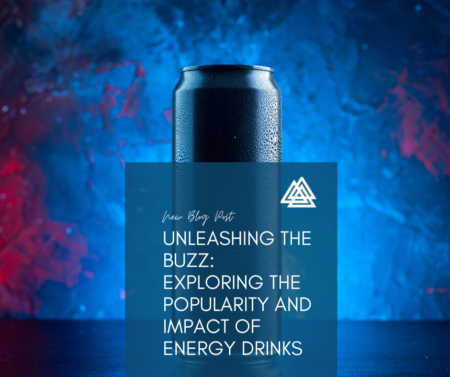 Energy drinks have become a ubiquitous part of modern life, offering a quick boost of energy to help people power through busy days, long nights, and demanding tasks. From students pulling all-nighters to professionals meeting tight deadlines, the allure of these caffeinated concoctions is undeniable. But what is driving their popularity, and what are the impacts of consuming energy drinks? This blog post delves into the rise of energy drinks, their effects on health, and how to use them responsibly.
Energy drinks have become a ubiquitous part of modern life, offering a quick boost of energy to help people power through busy days, long nights, and demanding tasks. From students pulling all-nighters to professionals meeting tight deadlines, the allure of these caffeinated concoctions is undeniable. But what is driving their popularity, and what are the impacts of consuming energy drinks? This blog post delves into the rise of energy drinks, their effects on health, and how to use them responsibly.
The Rise of Energy Drinks
Historical Context
Energy drinks as we know them today emerged in the late 20th century, but the concept of energy-boosting beverages isn’t new. Early versions included tonic wines and caffeinated colas. The modern energy drink market began to take shape in the 1980s and 1990s with the introduction of brands like Red Bull. Since then, the industry has exploded, with countless brands and flavors hitting the shelves.
Market Growth
The global energy drink market has seen exponential growth. According to market research, the industry was valued at over $50 billion in 2020 and is projected to continue growing. This surge is driven by aggressive marketing, appealing flavors, and the promise of enhanced performance and alertness.
Target Demographics
Energy drinks are particularly popular among young adults, athletes, and busy professionals. Their marketing often targets these groups, emphasizing benefits like improved focus, increased endurance, and enhanced physical performance. However, their appeal has broadened, reaching a wider audience looking for a quick energy fix.
Ingredients and Their Effects
Common Ingredients
Energy drinks typically contain a mix of the following ingredients:
- Caffeine: The primary ingredient, known for its stimulating effects.
- Taurine: An amino acid that supports neurological development and regulates water and mineral levels in the blood.
- Sugar: Provides a quick energy boost but can lead to crashes and other health issues.
- Vitamins: Especially B-vitamins, which are essential for energy metabolism.
- Herbal Extracts: Such as ginseng and guarana, believed to enhance energy and alertness.
Health Impacts
While energy drinks can provide temporary benefits, their health impacts can be concerning:
Positive Effects:
- Increased Alertness: Caffeine can improve concentration and reaction time.
- Enhanced Physical Performance: Ingredients like caffeine and taurine may enhance physical endurance and strength.
Negative Effects:
- Caffeine Overload: Excessive caffeine intake can lead to jitteriness, anxiety, insomnia, and, in severe cases, heart palpitations and high blood pressure.
- Sugar Content: High sugar levels contribute to weight gain, dental problems, and the risk of type 2 diabetes.
- Dependency: Regular use can lead to caffeine dependency, requiring higher doses to achieve the same effects.
The Social and Cultural Impact
Lifestyle and Identity
Energy drinks have become more than just beverages; they are lifestyle products. Their branding often aligns with extreme sports, adventure, and a high-octane lifestyle. This cultural positioning makes them appealing to those who identify with these values.
Marketing Influence
The marketing strategies of energy drink companies play a significant role in their popularity. Sponsorships of sports events, partnerships with influencers, and eye-catching advertisements contribute to their pervasive presence. The image of energy drinks as cool and edgy appeals to a broad audience.
Accessibility and Convenience
Energy drinks are widely available, from convenience stores to gyms and vending machines. Their convenience is a major factor in their popularity, providing an easy solution for people needing a quick energy boost.
Responsible Consumption
Moderation is Key
While energy drinks can offer temporary benefits, it’s crucial to consume them in moderation. The FDA recommends a maximum daily caffeine intake of 400 milligrams for most adults, equivalent to about four 8-ounce cups of coffee. Energy drinks can contain varying amounts of caffeine, so it’s essential to check the labels and monitor your intake.
Alternatives to Energy Drinks
For those seeking sustained energy without the downsides of energy drinks, consider these alternatives:
- Hydration: Drinking plenty of water can prevent fatigue.
- Balanced Diet: Consuming a diet rich in whole foods, including fruits, vegetables, and lean proteins, provides natural energy.
- Regular Exercise: Physical activity boosts energy levels and overall well-being.
- Adequate Sleep: Prioritizing good sleep hygiene ensures you wake up refreshed and energized.
Awareness and Education
Understanding the ingredients and potential effects of energy drinks is vital. Educating yourself and others about responsible consumption can mitigate health risks. Parents and educators should guide young people, who are particularly susceptible to marketing influences and may be unaware of the risks.
Energy drinks have carved out a significant place in modern culture, promising quick energy boosts and enhanced performance. While they can offer temporary benefits, it’s essential to be mindful of their potential health impacts and consume them responsibly. By understanding the ingredients, monitoring intake, and considering healthier alternatives, individuals can enjoy the benefits of energy drinks without compromising their health and well-being. Stay informed, stay energized, and make choices that support long-term health.
